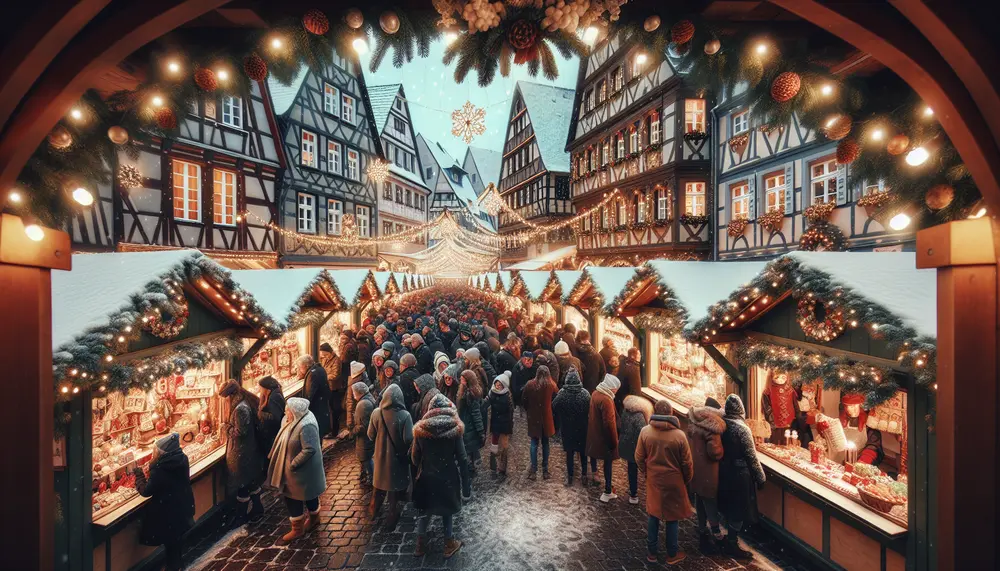Table of Contents:
Introduction to Germany's Christmas Markets
Germany's Christmas markets are a magical experience that draw visitors from around the world. These markets, known as "Weihnachtsmärkte," are a beloved tradition that dates back to the Middle Ages. They offer a unique blend of festive cheer, traditional crafts, and culinary delights.
Each market has its own distinct character, reflecting the local culture and history. From the bustling streets of Berlin to the quaint squares of Nuremberg, these markets transform cities into winter wonderlands. The air is filled with the scent of roasted chestnuts and the sound of carolers, creating an atmosphere that is both enchanting and inviting.
Visitors can explore a variety of stalls selling handmade gifts, ornaments, and seasonal treats. The highlight for many is the glühwein, a warm spiced wine that is perfect for sipping on a cold winter's night. Whether you're a first-time visitor or a seasoned traveler, Germany's Christmas markets offer something for everyone.
The Charm of German Christmas Markets
The charm of German Christmas markets lies in their ability to transport visitors to a festive wonderland. Each market is a unique tapestry of lights, sounds, and scents that captivate the senses. As you wander through the stalls, you'll discover a world filled with handcrafted treasures and seasonal delicacies.
One of the most enchanting aspects is the atmosphere. Twinkling lights adorn every corner, and the sound of holiday music fills the air. The markets are often set against the backdrop of historic buildings, adding a touch of old-world charm to the experience.
Another key element is the community spirit. Locals and tourists alike gather to celebrate the season, creating a warm and welcoming environment. It's a place where you can share a laugh with a stranger over a cup of glühwein or join in a traditional dance.
These markets are not just about shopping; they are about creating memories. Whether you're admiring the intricate craftsmanship of a wooden toy or savoring a freshly baked pretzel, the experience is one that stays with you long after the holiday season has ended.
Overview of Germany's Top Christmas Markets
| Market Name | Location | Highlights | Specialty |
|---|---|---|---|
| Nuremberg Christkindlesmarkt | Nuremberg | Traditional stalls, Christkind opening ceremony | Authentic Lebkuchen |
| Dresden Striezelmarkt | Dresden | Stunning Christmas pyramid | Stollen cake |
| Cologne Christmas Market | Cologne | Set against Cologne Cathedral | Range of crafts and culinary treats |
| Stuttgart Christmas Market | Stuttgart | Over 280 decorated stalls | Wide variety of entertainment |
| Munich Christkindlmarkt | Munich | Traditional Bavarian gifts | Festive atmosphere |
Popular Christmas Markets to Visit
Germany is home to numerous Christmas markets, each offering its own unique experience. Here are some of the most popular markets that should be on your must-visit list:
- Nuremberg Christkindlesmarkt: One of the oldest and most famous, this market is renowned for its traditional stalls and the iconic Christkind, who opens the market each year.
- Dresden Striezelmarkt: Known for its stunning Christmas pyramid and delicious Stollen cake, Dresden's market is a feast for the senses.
- Cologne Christmas Market: Set against the backdrop of the magnificent Cologne Cathedral, this market offers a wide range of crafts and culinary delights.
- Stuttgart Christmas Market: With over 280 beautifully decorated stalls, Stuttgart's market is one of the largest in Germany and offers a variety of entertainment options.
- Munich Christkindlmarkt: Located in Marienplatz, this market is famous for its traditional Bavarian gifts and festive atmosphere.
Each of these markets offers a distinctive experience, from the historical charm of Nuremberg to the vibrant energy of Cologne. No matter which market you choose to visit, you're sure to find a delightful mix of tradition, culture, and holiday cheer.
Exploring Traditional Crafts and Gifts
One of the highlights of visiting German Christmas markets is the opportunity to explore a wide array of traditional crafts and gifts. These markets are a treasure trove of handmade items that reflect the rich cultural heritage of the region.
Artisans from across Germany showcase their skills, offering everything from intricately carved wooden toys to delicate glass ornaments. Each piece is crafted with care, making them perfect for unique holiday gifts or cherished keepsakes.
- Wooden Nutcrackers: These iconic figures are a staple of German Christmas markets. They come in various designs, each with its own personality and charm.
- Hand-Blown Glass Ornaments: These delicate decorations are often painted by hand, adding a touch of elegance to any Christmas tree.
- Advent Wreaths: Traditionally made from evergreen branches, these wreaths are adorned with candles and decorations, symbolizing the anticipation of Christmas.
- Textile Crafts: From knitted scarves to embroidered tablecloths, textile crafts offer warmth and beauty for the winter season.
Exploring these crafts is not just about shopping; it's about appreciating the artistry and tradition behind each creation. Whether you're purchasing a gift or simply admiring the craftsmanship, these markets provide a glimpse into the heart of German culture.
Savoring Glühwein and Festive Treats
No visit to a German Christmas market is complete without savoring glühwein and indulging in festive treats. Glühwein, a warm spiced wine, is a staple of these markets, offering a comforting warmth against the winter chill. It is often infused with flavors like cinnamon, cloves, and citrus, creating a delightful aroma that fills the air.
Beyond glühwein, the markets are a haven for food lovers, offering a variety of traditional German snacks and sweets. Here are some must-try treats:
- Lebkuchen: These gingerbread cookies come in various shapes and are often decorated with icing. They are a sweet symbol of the holiday season.
- Bratwurst: A classic German sausage, grilled to perfection and served in a bun, often with mustard or sauerkraut.
- Roasted Chestnuts: A warm and nutty snack, perfect for munching as you stroll through the market.
- Stollen: A rich fruit bread, dusted with powdered sugar, that is a traditional Christmas treat in Germany.
These culinary delights are more than just food; they are an integral part of the festive experience. Sharing a cup of glühwein or a plate of bratwurst with friends and family adds to the joy and camaraderie of the season, making your visit to the Christmas markets truly memorable.
Family-Friendly Activities and Entertainment
German Christmas markets are not just for adults; they offer a wide range of family-friendly activities and entertainment that delight visitors of all ages. These markets are designed to create a festive atmosphere where families can enjoy the holiday spirit together.
Children will be enchanted by the magical settings and the variety of activities available. Here are some popular options:
- Ice Skating Rinks: Many markets feature ice skating rinks where families can glide together under twinkling lights, creating unforgettable memories.
- Carousel Rides: Traditional carousels with beautifully painted horses and carriages offer a nostalgic ride for children and adults alike.
- Storytelling Sessions: Gather around as storytellers share classic holiday tales, capturing the imagination of young listeners.
- Live Performances: From puppet shows to musical acts, live entertainment is a staple, providing joy and laughter for everyone.
These activities are designed to engage and entertain, ensuring that the Christmas markets are a joyful experience for the whole family. Whether it's a child's first carousel ride or a shared moment on the ice, these experiences help create lasting holiday traditions.
Plan Your Visit: Tips and Recommendations
Planning your visit to Germany's Christmas markets can enhance your experience and ensure you make the most of your time. Here are some tips and recommendations to help you navigate these festive events:
- Timing is Key: Visit during weekdays or early in the day to avoid the crowds. Evenings and weekends tend to be busier, especially in popular markets.
- Dress Warmly: Winter in Germany can be chilly, so layer up to stay comfortable while exploring the outdoor markets.
- Bring Cash: While some vendors accept cards, it's best to have cash on hand for smaller purchases and food stalls.
- Try Local Specialties: Each region has its own culinary delights, so be sure to sample local treats unique to the area you're visiting.
- Plan Your Route: If you're visiting multiple markets, plan your route in advance to maximize your time and experience different atmospheres.
By following these tips, you can enjoy a seamless and enjoyable visit to the Christmas markets. Whether you're a first-time visitor or a seasoned traveler, a little preparation goes a long way in ensuring a memorable holiday experience.
Conclusion: Embrace the Festive Spirit in Germany
Germany's Christmas markets offer a unique opportunity to embrace the festive spirit in a way that is both traditional and enchanting. From the charming stalls filled with handcrafted gifts to the delightful aromas of glühwein and festive treats, these markets capture the essence of the holiday season.
Visiting these markets is more than just a shopping trip; it's an experience that brings people together in celebration. The combination of twinkling lights, joyful music, and the warmth of community creates an atmosphere that is truly magical.
Whether you're exploring the historic streets of Nuremberg or enjoying a family outing in Stuttgart, the Christmas markets in Germany provide a memorable experience that resonates with the joy and wonder of the season. Embrace the opportunity to create lasting memories and immerse yourself in the festive traditions that make Germany's Christmas markets so special.
FAQ about Germany's Christmas Markets
What makes German Christmas markets unique?
German Christmas markets are unique due to their blend of historical charm, handcrafted gifts, and festive culinary delights. Each market reflects the local culture and offers a warm, welcoming atmosphere.
Which are the top Christmas markets to visit in Germany?
Some must-visit markets include Nuremberg Christkindlesmarkt, Dresden Striezelmarkt, Cologne Christmas Market, Stuttgart Christmas Market, and Munich Christkindlmarkt, each offering a distinctive experience.
What traditional crafts can be found at these markets?
Visitors can find intricately carved wooden toys, hand-blown glass ornaments, advent wreaths, and various textile crafts, all showcasing the rich cultural heritage of Germany.
What festive treats should you try at German Christmas markets?
Traditional treats such as glühwein, lebkuchen, bratwurst, roasted chestnuts, and stollen are must-tries, offering a taste of festive cheer and German culinary tradition.
What tips can help enhance your Christmas market experience?
Plan to visit during weekdays to avoid crowds, dress warmly, bring cash for purchases, and try local specialties to fully embrace the festive experience at each unique market.



